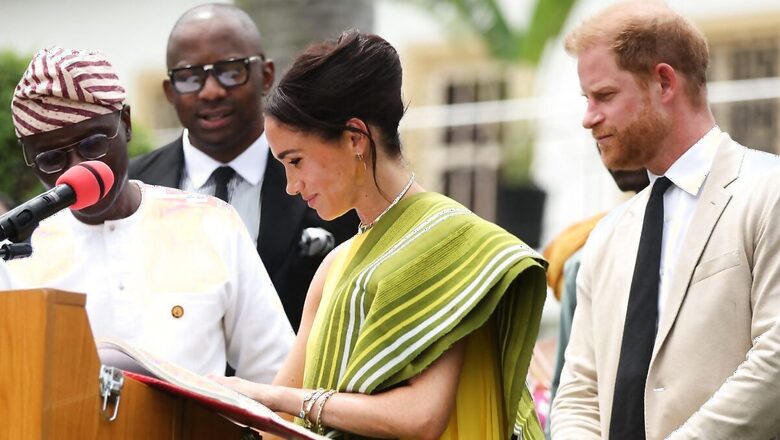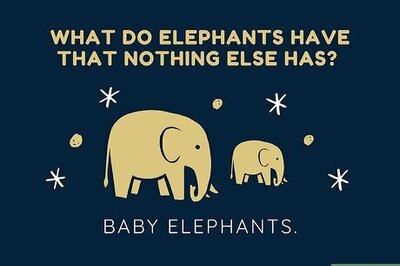
views
When Meghan Markle first strategically revealed that she is 43 per cent Nigerian in 2022 on a podcast, it did not create much of a stir. But two years hence, her discovery paid off in the form of an almost-royal visit by the Duke and Duchess of Sussex to West Africa’s most populous country last week, where they were given a rapturous welcome. After all, Indians are not the only ones who get excited by the prospect of welcoming a famous ‘diaspora’, however distant.
And now her fans aver her ‘revelation’ and 2024 visit had the same impact as her late mother-in-law Princess Diana’s 1990 trip to Nigeria. Needless to add, her father-in-law’s three subsequent visits there (including two with her current mother-in-law) did not make waves. Meghan’s decision to visit Nigeria herself—as a “returning daughter”— with her obliging royal husband Harry in tow is not surprising at all, It is in keeping with rising identity politics in the US.
That Meghan’s African roots are purportedly in that corner of the continent is expected. Most slaves taken to the so-called Americas were captured and transported from western and central Africa. Less than 4 per cent of them landed in the US, though; most were taken as slave labour for plantations in the Caribbean and Brazil. They and the slaves who toiled in the cotton fields of the southern US were not allowed to retain their language or culture, so few knew their roots.
So, for many African Americans, the route back to their roots was the publication of Alex Haley’s gripping bestseller Roots in 1975 and its hit TV version that aired in 1977. The protagonist there was supposedly from The Gambia, now one of the smallest nations in west Africa. In reality, far more were captured from what is now Nigeria, probably 3.5 million in all. Interestingly, local tribal hierarchies and rivalries led to many of them actually helping European slave traders.
Their terrible ordeal once they arrived in the US is well known. Though slavery was abolished in 1865 in the US, it took another century before segregation of races—which made interracial marriages illegal—was formally discarded in 1964. So even though they were nominally “free”, most African-Americans had no choice but to marry within their own race, thereby further blurring any micro-ethnic differences their ancestors may have brought from Africa.
Given the strong and distinct cultural ethic of their communities, calling Mindy Kaling and Lucy Liu “Asian” just because both their ancestral countries are on that continent is ridiculous. But Africans had been homogenised to such an extent in the US that they did not think of themselves as any hyphenated American even if they knew where their ancestors came from. Barack Obama is the son of a first-generation migrant but is he regarded as a Kenyan-American?
Unlike Irish-Americans or Italian-Americans, African-Americans did not consider tracing where their ancestors had been trafficked from as a priority. As they had developed their own distinct culture and customs through centuries of lack of contact with African languages and cultures, there was no impetus to look back, much less go back. Intermarriage within their broader “race” category also forged a unified self-image rooted in their common slavery experience.
Though the US has long described itself as a melting pot, even the term “multi-racial” or even “bi-racial” is a relatively new concept there. Only from the 2000 census were Americans able to describe themselves as being from more than one race. It has also been noted that by 2015, people’s perception of their own race (and that of their parents and grandparents) had become more nuanced. In short, the US was finally acknowledging that it is not a black-or-white world out there!
Now Meghan has cleverly tapped into that emerging stream of US politics, aided by the magical new tool called DNA testing. According to a Pew Research Centre study in 2018, around 6.2 million US adults say they are descended from two or more races. Of them, 22 per cent are White and American-Indian, 21 per cent are Black and White, 20 per cent are White and Asian-American, 4 per cent are Black and American-Indian and 2 per cent are Black and Asian-American; 31 per cent are other combinations.
US Vice President Kamala Harris is of mixed lineage, with an Indian mother and a Jamaican father. Curiously, ‘Jamaican’ is regarded as a separate ancestry from ‘African’ in the US, but 90 per cent of the population of that Caribbean nation is of African ancestry; only 7 per cent are mixed-race and 3 per cent of European, Chinese or Indian descent. However, when building a new post-colonial nation, the overwhelmingly African ethnicity was set aside for a more unified ‘chutney’ identity!
It is now exactly 60 years since segregation—formal racism—ended in the US and its African-American community has undergone an enormous change in self-perception. While the creation in 1966 of an African-American festival like Kwanzaa (based on West African harvest celebrations) on the last five days of the calendar year cemented the pan-African identity of the community, there are finally initiatives by a few celebrities to trace their specific roots.
Before the era of easy DNA tests, Michael Jackson famously sang Liberian Girl (part of his superhit Bad album) which many fans took to mean an assertion of a family connection to the country, although there is no clarity on which part of the continent his African ancestry can be traced to. But the fact that there is increased chatter on social media about a more granular African identity these days, coupled with the convenience of DNA tests, this trend is on the upswing.
Meghan’s even more famous friend Oprah Winfrey’s DNA test results revealed 89 per cent Sub-Saharan African, 8 per cent Native American and 3 per cent East Asian roots. No country is specified so Winfrey can choose. Ditto Whoopi Goldberg (92 per cent sub-Saharan African and 8 per cent European) and Chris Tucker (83 per cent sub-Saharan African, 10 per cent Native American, 7 per cent European). Samuel L Jackson found he is of Gabonese descent and therefore now even has dual citizenship from that country.
Recent immigration from Africa to the US has added a new dimension to the ‘Black’ identity as those new migrants are not linked by the slavery experience to the older African-American community there. Given Meghan’s acumen, she has probably sussed that not only is it quite easy to forge new links with African countries via the DNA route, but that such a discovery also helps form a new bond with migrants from there who have just set down roots in the US.
So, after having presciently described herself as an “ethnic chameleon” in an article in Elle in 2016, Meghan calling herself 43 per cent “Nigerian” in 2024 and acquiring a royal mantle from her ‘native’ country, is par for the course. Any mention of shades of grey in her ancestry will be dismissed as malice. Meghan referring to Nigeria as her ‘motherland’ on Mother’s Day may not be just a clever gesture; it may portend a new era in African-American politics.
The author is a freelance writer. Views expressed in the above piece are personal and solely those of the author. They do not necessarily reflect News18’s views.



















Comments
0 comment